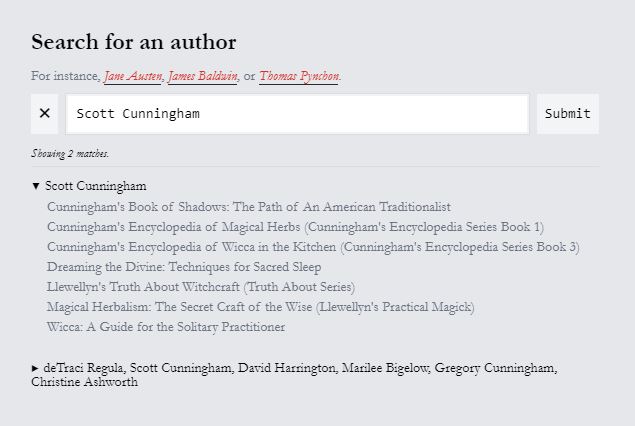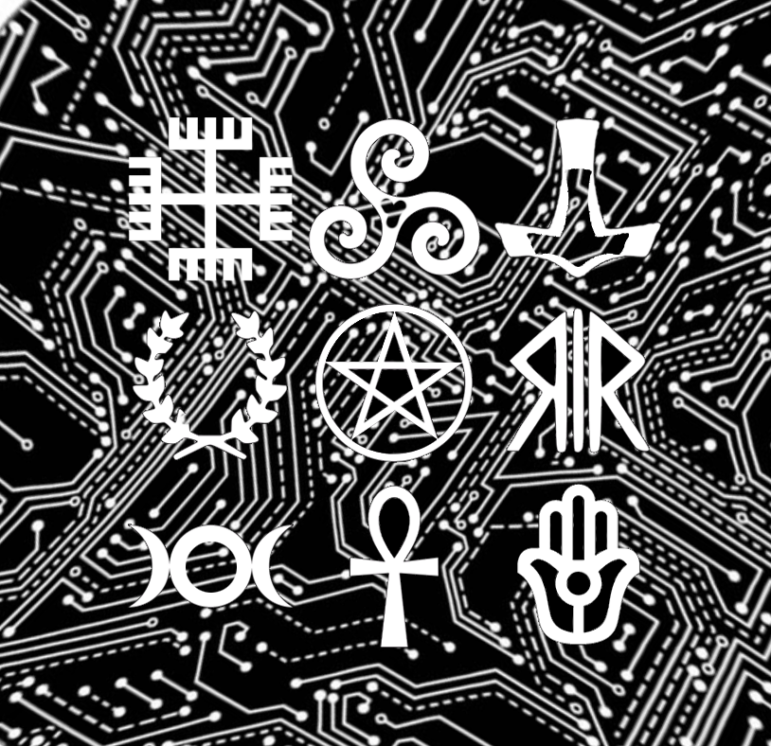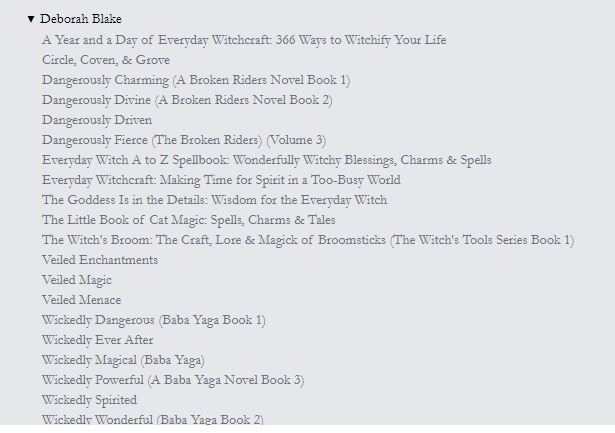This is the first in a series that will explore the impacts of AI-generative text on the Pagan community, and beyond.
TWH – Late last month The Atlantic published an article that provided a search tool for the 191,000 written works that are contained in what is identified as the data set “Book 3” and that have been used to train generative-AI systems created and owned by major developers, like Meta, Open AI, and a number of others.
One of the major issues with the database is that of the 191,000 titles, at least 183,000 of them were scraped from online sources and used entirely without the permission of the authors who created the works. Among those authors and titles to be found in “Book 3” are a number of Pagan authors.
While the majority of the results from searches run seemed to produce titles that fell roughly within the last 20 years in terms of publishing, not all of them did. There also seemed to be no titles or authors that had been released in the past two or three years.

Screenshot of a search query of “Book 3”
This revelation of so many written works having been pirated to fuel the training of AI-generative system LLMs (large language models) has helped to trigger one of the largest legal battles between AI-generative creators in the tech industry and the writers whose work has been stolen and used without their permission.
AI or artificial intelligence has been with us for quite some time. It is the programming that is used in basically any smart device–virtual assistants like Alexa and Siri, newer cars, all smartphones–all use some form of AI in order to produce the answers and effects requested.

AI-generative systems are different in that they are not just supplying information or making a temperature adjustment to a smart thermostat. Up until just a few years ago, AI-generative systems were not mainstream and lacked the level of programming to actually create anything “new.” Some would argue these generative systems still lack the ability to actually create anything since they are merely stitching together the information accessed through databases and are completely reliant on their programming.
The introduction of Chat-GPT (Chat Generative Pre-trained Transformer) an LLM chatbot on November 30, 2022, allowed users to receive answers to questions, receive help writing emails, essays, and code. By January, the application had acquired over 100 million users and had gained mainstream attention.
The initial Chat-GPT was free, but soon a subscription version was rolled out that offered users even more options for use. While many hailed it as a game changer, concerns were raised over how the chatbot could be used. For instance, it might be used by students to generate presumably correct answers to test questions or to compose term papers or other written material in order to achieve a higher grade.
There are a plethora of ethical concerns when it comes to AI-generative systems. These range from how the systems are trained, to bias by programmers, to incorrect information being offered as fact, known as hallucinations. And the general overarching concern of how the use and development of such systems might be applied in the future.
The fact that close to several hundred thousand written works were pirated from online sources in just the data source of “Books 3” does not help to ease these concerns.
Writers, and especially Pagan authors, already see very little financial return from their written works and most lack representation by any organization or guild. While a number of guilds exist to represent writers and creative works–The Authors Guild, Romance Writers of America, and Horror Writers’ Association–they are tiny compared to other industry organizations such as the Writers Guild of America and the Screen Actors Guild of America.

MJT Image
TWH spoke with several authors whose work was searchable within “Book 3.” Deborah Blake, who had the largest number of titles, 20, was also listed in other searches where her essays were part of a larger volume, like Llewellyn’s Magical Almanac (2015 and 2017).

Screenshot of the results of a search for the titles by Deborah Blake
Blake has penned a number of books both magical non-fiction and fiction, has authored several tarot decks with artist Elisabeth Alba, and is a member of both The Authors Guild and Romance Writers of America.
When asked about the current lawsuit being brought by The Authors Guild, Blake said, “I believe that The Authors Guild includes all of its members in its lawsuit, although I’m not sure.”
Blake also noted the ongoing issue with piracy of Pagan works, and was unsure as to what options might be possible to protect creative works, especially in light of AI-generative systems.
“I just don’t know. We are already dealing with so much piracy (my tarot deck probably has more pirated copies in circulation than real ones by now, and they are everywhere), which cuts into what little profit authors and publishers make. Having AI (which in this form is really just another kind of piracy) too is going to make it very difficult for both those groups.”
As for the future and how Pagan works might be protected, Blake told TWH, “I believe the publishers of Pagan works, like my publisher Llewellyn, are working on what they might be able to do to protect their authors. Otherwise, honestly, I have no idea.”
TWH reached out to Markus Ironwood, Publicist for Llewellyn Worldwide and Ironwood responded with the following:
Llewellyn takes piracy very seriously and has for decades. In regard to the database of 183,000+ titles, Llewellyn is aware than many Llewellyn titles are found there. It saddens us to see so many author’s works pirated in this manner. AI generated content is a huge issue and something we have been regularly discussing at the office for nearly a year.
We don’t have a comment or statement prepared at this moment other than we are researching what legal actions are possible.
Ivo Dominguez Jr. whose book, Practical Astrology for Witches and Pagans published by Red Wheel Weiser was also found within “Book 3.” Dominguez is also a member of The Authors Guild.
Dominguez pointed out the small size of most literary guilds and that, “Not very many Pagan writers are members of any writer’s guild, which are often overwhelmed by just usual business—representing members in contracts disputes, copyright infringement, and various other functions.”
As for the current lawsuit being brought by The Authors Guild he noted, “For the Pagan community, the lawsuit focuses on broad markets, but the margin for Pagan and niche authors is so much smaller.”
How to protect Pagan works seems to be a pivotal issue and one that no one seems to have much of an answer for.
Michael M. Hughes, whose novel, Blackwater Lights was found within “Book 3″ while not a member of any of the writer’s guilds, said, ” I imagine Pagan and occult authors would have to team up with larger organizations representing writers as a whole—I’m very doubtful we have the numbers or resources to build our own representation, as we are a niche within a niche.”
Occultist and author Michelle Belanger, who has been involved with the Horror Writers’ Association, underlined the increasing threats artists, content creators, and writers face, “Protecting intellectual property is a daunting issue, particularly now in the Digital Age. It has never been easier for scammers to scan, distribute, and profit from another person’s work through the same digital distribution and print-on-demand outlets that have allowed many Pagan authors to share their writing with the world.”
Belanger continued, “A casual glance on sites like Etsy will reveal a rolling set of accounts that provide PDF libraries of stolen work and knock-off Tarot decks, just for starters. Collectivized action seems to be the only viable route for recompense, but for Pagan authors, the first and most salient question would be, ‘Collectivization under whom?’
“We are a patchwork lot, spread out among a number of small, niche publishing houses, many of which we started and maintain ourselves.”
Another point Belanger made is how it has only been in recent years that Pagan authors were eligible to join some guilds, “Very few, if any, Pagan authors have representation with a literary agency or guild – most agents don’t see Pagan books as profitable enough to be worth their time and until very recently, most Pagan authors wouldn’t have even qualified for membership in the various writers’ guilds. Instead, we find ourselves representing our own works and interests, struggling to get fake accounts taken down and stolen works removed from sale in this Wild West of plagiarists, piracy, and now AI-generated content that is often a thinly disguised pastiche of fully recognizable works.”
TWH will explore what the future might hold for Pagan authors and some of the ethical concerns writers have expressed regarding how AI-generative can and might be used moving forward.
The Wild Hunt is not responsible for links to external content.
To join a conversation on this post:
Visit our The Wild Hunt subreddit! Point your favorite browser to https://www.reddit.com/r/The_Wild_Hunt_News/, then click “JOIN”. Make sure to click the bell, too, to be notified of new articles posted to our subreddit.